 Petzlover
Petzlover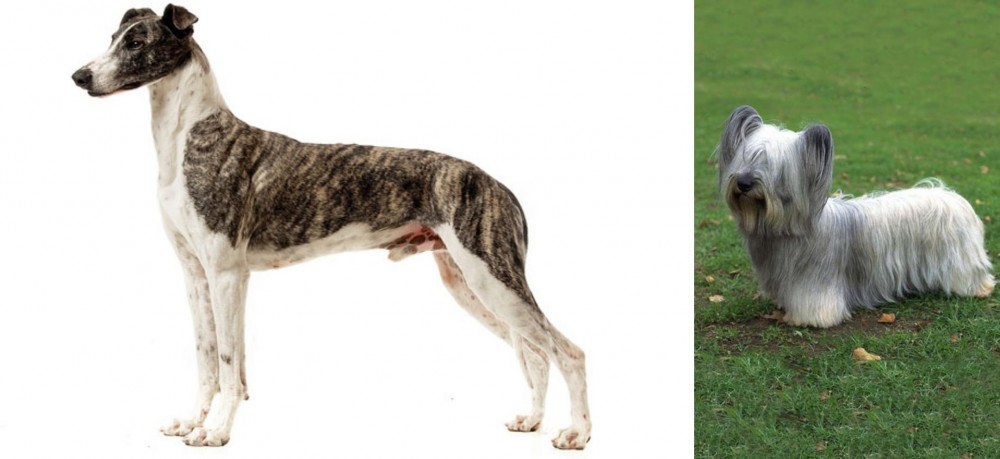 Magyar Agar is originated from Hungary but Skye Terrier is originated from United Kingdom. Magyar Agar may grow 44 cm / 18 inches higher than Skye Terrier. Magyar Agar may weigh 13 kg / 29 pounds more than Skye Terrier. Both Magyar Agar and Skye Terrier has almost same life span. Magyar Agar may have more litter size than Skye Terrier. Magyar Agar requires Low Maintenance. But Skye Terrier requires Moderate Maintenance
Magyar Agar is originated from Hungary but Skye Terrier is originated from United Kingdom. Magyar Agar may grow 44 cm / 18 inches higher than Skye Terrier. Magyar Agar may weigh 13 kg / 29 pounds more than Skye Terrier. Both Magyar Agar and Skye Terrier has almost same life span. Magyar Agar may have more litter size than Skye Terrier. Magyar Agar requires Low Maintenance. But Skye Terrier requires Moderate Maintenance
 The tall, slender Magyar Agar is a sighthound dog breed hailing from Hungary and which has been used for hunting and coursing, some dogs of which are still used for this purpose today.
The tall, slender Magyar Agar is a sighthound dog breed hailing from Hungary and which has been used for hunting and coursing, some dogs of which are still used for this purpose today.
Those who know the dog breed well will tell you that the dog isn’t the 'Hungarian greyhound', being a distinct breed with its own characteristics and breed designation.
They certainly go back centuries, and in fact, records tell us that they arrived in northeastern Hungary more than a thousand years ago.
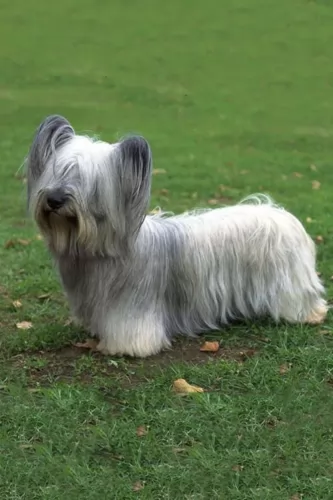 The Skye Terrier is a hardy dog breed and is actually considered to be an endangered native dog breed in the United Kingdom.
The Skye Terrier is a hardy dog breed and is actually considered to be an endangered native dog breed in the United Kingdom.
They were found on the Isle of Skye, although there is some confusion about its history. They were used long ago to hunt but these days they are essentially companion dogs.
They found their way to America and the Skye Terrier Club of America was founded in 1938. The American Kennel Club recognized the breed in 1887.
 Described as a large dog resembling a Greyhound and being more longer in body than being tall they are more heavily boned than the fine-boned Greyhound.
Described as a large dog resembling a Greyhound and being more longer in body than being tall they are more heavily boned than the fine-boned Greyhound.
The Magyar is a large dog standing at between 62 – 70cm in height and weighing between 22 and 31kg. If you want your Magyar to have puppies, these dogs can produce between 6 to 10. The dogs have a smooth dense coat and the coat can be any color, but not black and tan or tri-color.
The ears of the dog are short to medium and are semi-erect, semi-floppy and most times held back. The tail of the dog is long.
These are hardy dogs, and even with their short coats they are able to cope with lower temperatures. They are quiet and docile and are loving towards their human family. They also have a strong instinct to guard their owners.
They are amicable dogs, getting on well with children and pets in the home.As with most dogs, he can benefit from training and socialization. He is an adaptable dog too and will settle into life in the city or the countryside, but wherever he lives, he will need to be exercised well.
They love cozying up to their owners on the couch and thoroughly relaxing, but they also love being out and about too. A walk in the countryside or the park is a a chance to be let off the leash for some running.
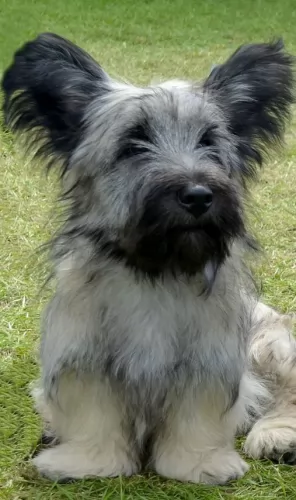 The Skye Terrier is a medium-sized dog standing at between 23 and 26cm in height and weighing between 12 and 18kg. The legs are short and sturdy. He is double coated with the top coat being straight and hard and forming a beard around the face area. The coat can be fawn, and in various shades of grey which are sometimes even black. The ears of the dog are medium sized and erect.
The Skye Terrier is a medium-sized dog standing at between 23 and 26cm in height and weighing between 12 and 18kg. The legs are short and sturdy. He is double coated with the top coat being straight and hard and forming a beard around the face area. The coat can be fawn, and in various shades of grey which are sometimes even black. The ears of the dog are medium sized and erect.
The Skye Terrier has always been a hunting dog and he enjoys quite a bit of exercise – walks, ball games as well as indoor games. Small though he may be, he is strong willed with a mind of his own and will benefit from being trained and socialized.
This is also necessary as he has a fairly reserved nature. He gets on well with children and makes an excellent family pet but he is ready to take on smaller pets in the home. He will bark when confronting strangers and makes an excellent watchdog too.
He is able to adapt well into life in the city or the countryside. He isn’t a dog to be left outside day after day and will just die of boredom, frustration and loneliness.
 The Magyar Agar may well have been developed for hunting, but today he makes a splendid pet.
The Magyar Agar may well have been developed for hunting, but today he makes a splendid pet.
He is intelligent and quiet, as well as being loyal. While he loves being outside playing or going on walks, he is quite happy to curl up on the couch with you – the nearness to you is what he loves.
Beautiful and loving, this dog symbolizes the best qualities that man wants in a canine friend.
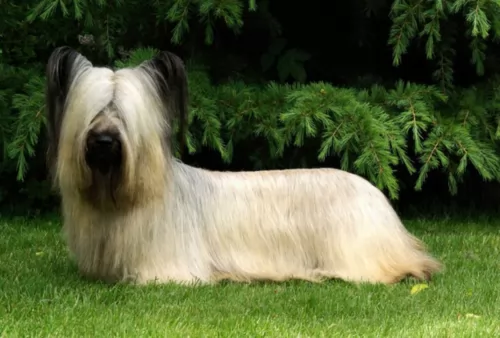 Give the Skye Terrier the attention he wants and he will reward you with his loving companionship.
Give the Skye Terrier the attention he wants and he will reward you with his loving companionship.
He loves the entire family but is best suited to homes where children have been taught to be kind to animals and to treat them with respect.
He has moderate energy levels and will expect you to give him a fair amount of exercise. The Skye Terrier can make an excellent companion for you and your family.
 The Magyar Agár is looked upon as a healthy dog breed, and with good care can live to be 12 to 14 years of age. With this dog you want to be on the lookout for some of the common dog illnesses he could succumb to -
The Magyar Agár is looked upon as a healthy dog breed, and with good care can live to be 12 to 14 years of age. With this dog you want to be on the lookout for some of the common dog illnesses he could succumb to -
This is a fairly common problem in dogs. The thyroid gland produces the hormone thyroxine with other thyroid hormones. Playing a role in the dog’s metabolism, when the thyroid is out of sync it can cause problems for your dog.
Hypothyroidism happens when your dog doesn’t secrete enough of the thyroid hormones, slowing the dog’s metabolism. Some of the symptoms include obesity, lethargy, coat thinning and cold intolerance.
This is an inherited disease of the retina, occurring in both eyes together. Thankfully it isn't painful for the dog. There are different types of inherited retinal degenerative diseases in dogs and the first signs of this are seeing your dog with night-blindness and the pupils being dilated. There is no cure, but specific antioxidant supplementation does help support the retinal health of the dog and can actually help to prevent vision loss.
Itching outbreaks from a skin allergy can make your pet miserable with constant licking and biting. Whether these allergies are inhaled, food related or from flea bites, they can cause your pet great discomfort. The fur or coat may even have started to fall out in patches. Allergies like this can occur when the dog's immune system is weakened. Feeding your dog some raw meat, getting him to the vet and providing excellent grooming can help with your pet’s skin problems.
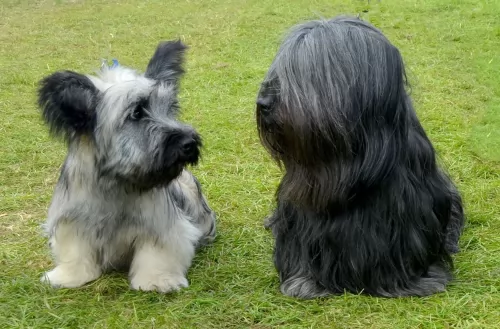 The Skye Terrier is a healthy dog breed. Perhaps the only issue that could be a problem with him is orthopedic problems. He is an achondroplastic dog, meaning a large body on small legs.
The Skye Terrier is a healthy dog breed. Perhaps the only issue that could be a problem with him is orthopedic problems. He is an achondroplastic dog, meaning a large body on small legs.
He could develop spinal problems if he were allowed to constantly be jumping off beds and high chairs.
Orthopedic problems affect the bones, muscles and joints and can actually be debilitating. Orthopedic conditions can be ligament tears or hip dysplasia for instance, accompanied by arthritis.
You’ll notice your dog has an abnormal way of walking or running, inability to get up once lying down and he may have arthritis and pain.Be careful because obesity can trigger problems with the joints and bones.
 Make sure you take wonderful care of your Magyar Agar. It is a social, living creature who needs to be loved and cherished.
Make sure you take wonderful care of your Magyar Agar. It is a social, living creature who needs to be loved and cherished.
Provide him with the best food there is. If you invest in dry kibble, try and add in cooked chicken, brown rice and raw or cooked vegetables from time to time as well as some raw meat. Keep the diet simple to avoid digestive upsets.
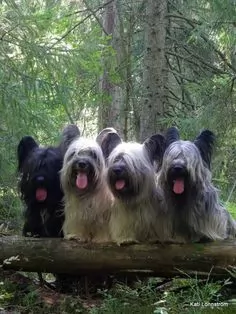 ● The coat of the Skye Terrier is long and silky and will most certainly require brushing every day if you keep the hair long. Such silky hair can easily become matted.
● The coat of the Skye Terrier is long and silky and will most certainly require brushing every day if you keep the hair long. Such silky hair can easily become matted.
● Little dogs like this will need their teeth being checked regularly. You can even try to buy special pet toothpaste and toothbrush and brush his teeth yourself. If you prefer, a professional dog groomer can do this for you and at the same time trim his nails and check his ears and clean the insides of the ears too to avoid infection.
● Provide him with top quality food as the quality of the dog food you buy makes a huge difference to his health and longevity. He is a small dog and there are some excellent commercially manufactured dog foods specially made for small, energetic dogs.
Try to include some home-made food for him which can be simply mixed into the dry kibble twice a week. Boiled chicken, brown rice or pasta and spinach, sweet potatoes and carrots is super tasty and nutritious. Ensure there is always a bowl of fresh, cool water within his reach.
● Keep his vaccines up to date against some deadly canine diseases, and get him to the vet when he shows signs of illness.